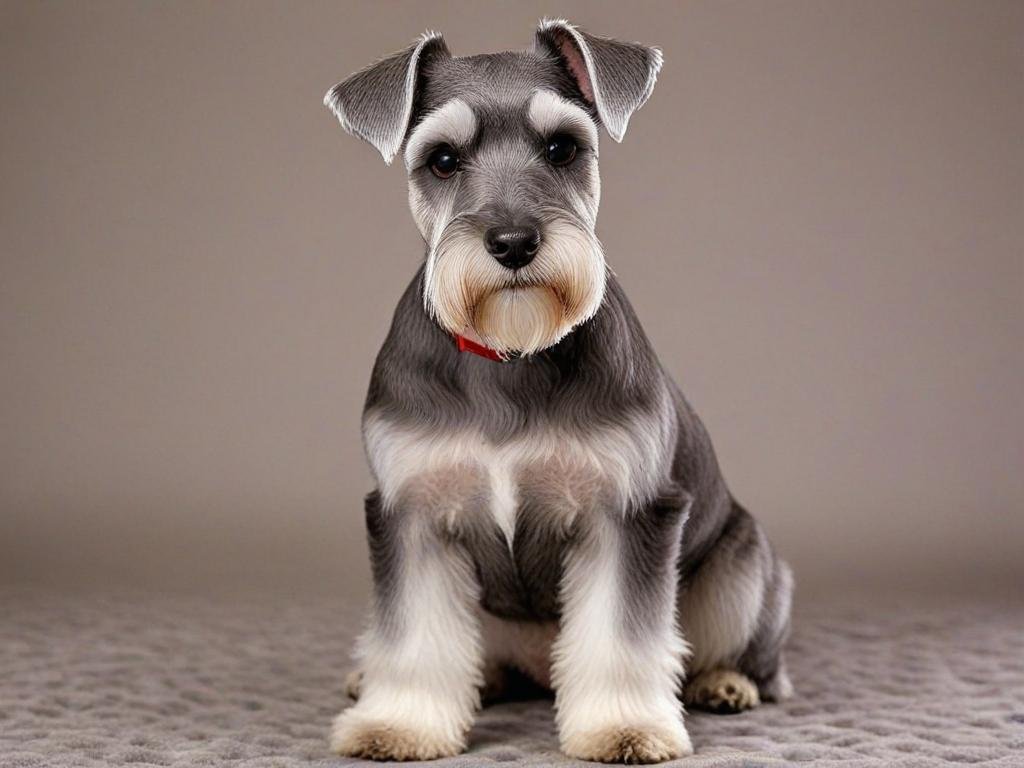The Miniature Schnauzer, with its distinctive beard and expressive eyes, is a popular and beloved breed known for its lively personality and sturdy build. This article explores the characteristics, origin, lifestyle, personality, lifespan, interesting facts, grooming needs, food habits, and care guidelines for the Miniature Schnauzer.
If you need vet appointment through us, please scroll to the bottom and fill up the form!
Characteristics
Miniature Schnauzers are small dogs, typically weighing between 11 to 20 pounds and standing 12 to 14 inches tall. They have a wiry, double coat that comes in several colors, including salt and pepper, black and silver, and solid black. Their bushy eyebrows, mustache, and beard give them a distinguished appearance. They are robust and muscular, with a square-shaped build.
Origin
The Miniature Schnauzer originated in Germany in the late 19th century. They were bred from Standard Schnauzers, Affenpinschers, and possibly Poodles to create a smaller version of the Standard Schnauzer that was adept at ratting and farm work. The breed quickly gained popularity for its versatility, intelligence, and charming personality.
Lifestyle
Miniature Schnauzers are highly adaptable and can thrive in various living situations, including apartments and houses with yards. They are active and energetic dogs that require regular exercise, such as daily walks, playtime, and mental stimulation. They enjoy participating in dog sports like agility, obedience, and rally.
Personality
Miniature Schnauzers are known for their spirited and friendly nature. They are intelligent, alert, and often act as excellent watchdogs. They are affectionate with their families and tend to be good with children and other pets. Miniature Schnauzers are playful and enjoy being the center of attention. They can be a bit stubborn but respond well to consistent and positive training methods.
Lifespan
The average lifespan of a Miniature Schnauzer is around 12 to 15 years. They are generally healthy dogs but can be prone to certain health issues, which proper care and regular veterinary check-ups can help manage.
Interesting Facts
- Distinctive Appearance: The Miniature Schnauzer’s beard and eyebrows give it a unique and expressive look.
- Versatile Workers: Originally bred for ratting, they are now popular as both family pets and show dogs.
- Three Schnauzer Types: There are three sizes of Schnauzers: Miniature, Standard, and Giant, with the Miniature being the smallest.
Grooming
Miniature Schnauzers require regular grooming due to their wiry coat. They should be brushed several times a week to prevent matting and keep their coat healthy. Regular professional grooming every 4 to 6 weeks is recommended to maintain their distinctive appearance. Their beard and facial hair need regular cleaning to prevent debris buildup. Additionally, their ears should be checked and cleaned regularly, and their nails should be trimmed as needed.
Food Habits and Preferences
Miniature Schnauzers should be fed a balanced diet that meets their nutritional needs based on their age, size, and activity level. High-quality commercial dog food is typically sufficient. They can be prone to obesity, so portion control and monitoring their weight are essential. Treats should be given in moderation, and fresh water should always be available.
Guidelines for Care
- Exercise: Provide regular exercise, including daily walks and playtime, to keep your Miniature Schnauzer physically and mentally stimulated.
- Training: Use positive reinforcement techniques for training. Miniature Schnauzers are intelligent and eager to learn but can be stubborn, so consistency and patience are key.
- Socialization: Expose your Miniature Schnauzer to various environments, people, and other animals from a young age to promote good behavior and reduce anxiety.
- Health Check-ups: Regular veterinary visits are essential to monitor their health, keep up with vaccinations, and prevent common health issues such as pancreatitis, bladder stones, and eye problems.
- Grooming: Regular brushing and professional grooming will keep your Miniature Schnauzer’s coat healthy and looking its best. Pay attention to ear cleaning, nail trimming, and dental care.
- Diet: Provide a balanced diet with appropriate portions to prevent obesity. Monitor their weight and adjust their diet as needed.
In conclusion, Miniature Schnauzers are lively, intelligent, and affectionate companions that make excellent pets for families and individuals alike. With proper care, attention, and training, Miniature Schnauzers can bring joy and love to any household.

